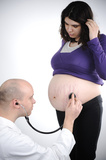Overweight Women, Fertility and Pregnancy – Does Obesity affect Fertility?
 Does being overweight affect your fertility? Yes, it does. And what about your weight during pregnancy? Excessive obesity during pregnancy can cause life long harm to your baby. Find answers to all your fertility related questions and have a safe pregnancy.
Does being overweight affect your fertility? Yes, it does. And what about your weight during pregnancy? Excessive obesity during pregnancy can cause life long harm to your baby. Find answers to all your fertility related questions and have a safe pregnancy.
Your Ideal Weight
A BMI (body mass index) of more than 30 can affect your fertility. Generally speaking, a BMI between 18.5 and 24.9 is considered normal, between 25 and 29.9 is overweight, and that above 30 is what we would call obesity.
Does Weight Affect Fertility?
Overweight and obesity lead to a decline in fertility. The worse consequences of weight are greater for a BMI > 30 . But we must not forget that age is also important and responsible for the natural decline infertility.
Whose Weight Affects Fertility?
Surprisingly, most women assume it is their weight that affects their fertility. But that is not so. The truth is that many couples have trouble having a child, because one of both partners is overweight. Obesity is also a leading cause of decline in fertility of Men.
In Women, overweight and obesity take their toll on ovulation. It may be of poor quality or even disappear. Even if ovulation is preserved, the oocytes are of lower quality, like the embryos obtained. Obese women are also three times more prone to miscarriages. The risk of miscarriage increases with BMI.
In Men, it is the sperm that is primarily affected and is less mobile.
It Could also be Polycystic Ovary Syndrome
Decreased Fertility is not only a direct result of obesity. Another major reason is the polycystic ovary syndrome, which is one of the leading causes of female subfertility and the most frequent endocrine problem in women of reproductive age. This disorder results in lower quality ovulation or no ovulation at all . Hormonal disorders associated with this disease are not related to BMI.
Complications during Pregnancy
Infertility is not the only consequence of obesity. It affects their pregnancy too. Gestational diabetes is five times more common in obese women than in women with normal BMI. If this can generally be controlled, hypertension during pregnancy (preeclampsia) it is more problematic. It can even endanger the life of the pregnant woman because her only cure in such a situation is the delivery of the child.
Risk of Premature Childbirth
Since constant pregnancy monitoring is restrictive in overweight women, it always carries the risk of C-section deliveries, premature childbirth and complicated childbirths due to the baby’s weight being more, resultantly.
Risk of Diabetes in the Baby
Obesity does not spare the unborn child. Right from the formation of the egg, obesity can lead to certain complications. In addition to the increased rate of miscarriage due to a more hostile endometrium for implantation, the weight can also be the cause of malformations of the embryo at the heart, and at the neural tube or slots palate. Finally, the child is also subjected to a risk of diabetes and obesity.
The Best Advice for Obese Women and Couples
To improve the fertility in obese or overweight women, weight loss is essential. There is now evidence that weight loss of 5 to 10% of body mass may allow a natural return of ovulation and improve the success rate of assisted deliveries which are getting more and more common these days.
Lose Weight Correctly
Where ovulation is observed after 6 to 9 months, a gynecological treatment can be prescribed. This treatment, often based on clomiphene citrate and metformin, is intended to allow the body to ovulate. But again, be aware that these treatments are more effective when accompanied by weight loss. That said, it is important not to lose weight too fast. Dietary weight loss can lead to deficiencies in women and lower the quality of sperm in men. If opting for a gastric bypass, it is recommended that to take a sample of semen and freeze for later use.
You Might Also Like:
Tips to Healthy Pre-Pregnancy Planning
Harmful Environmental Agents for Pregnancy

 Does being overweight affect your fertility? Yes, it does. And what about your weight during pregnancy? Excessive obesity during pregnancy can cause life long harm to your baby. Find answers to all your fertility related questions and have a safe pregnancy.
Does being overweight affect your fertility? Yes, it does. And what about your weight during pregnancy? Excessive obesity during pregnancy can cause life long harm to your baby. Find answers to all your fertility related questions and have a safe pregnancy.